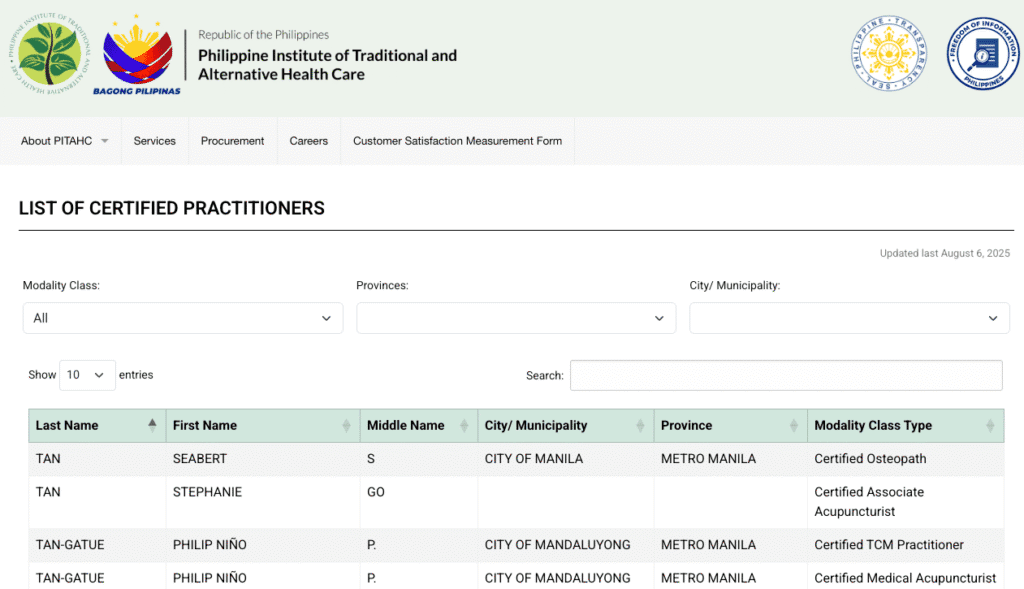A question often posed to a Philippine practitioner is, “are you licensed?” I have also seen some local practitioners refer to themselves as “licensed” in the Philippines.
Let us make it abundantly clear that as of this writing, there is no licensure exam for acupuncturists or traditional chinese medicine practitioners in the Philippines. What we do have is certification by a National Certification Commission for these modalities/medical systems. These Certification Commissions are run under the umbrella of the Philippine Institute of Traditional and Alternative Healthcare, a government owned and controlled corporation mandated by Republic Act 8423 to basically run everything related to traditional and alternative health practices. I myself am a member of the National Certification for Traditional Chinese Medicine. We do not give licensure exams but we examine the candidate’s qualifications and certify them.
Since a practitioner is certified by the appropriate National Certification Commission, then the proper titles for a locally registered and certified practitioners include:
Certified Medical Acupuncturist and Certified Associate Medical Acupuncturist – for Acupuncturist MDs like myself. The difference between the two is based primarily on the amount of training. The same goes for below.
Certified Acupuncturist and Certified Associate Acupuncturist – for non MD acupuncturists.

Foreign educated and/or licensed practitioners still have to be classified according to one of the above groups.
Another thing to note is that the Philippines separates acupuncture from Chinese herbal medicine, known officially as Traditional Chinese Medicine here. This is similar to systems in Indonesia and Canada, and unlike that in China and the United States, where a practitioner usually has one title that covers all modalities of Traditional Chinese Medicine. Also, there is only one title for certification in TCM.
I am certified in both, hence I use the titles Certified Medical Acupuncturist and Certified Traditional Chinese Medicine Practitioner (CMA and CTCMP).
I hope this clears things up!
Dr. Tan-Gatue is a Doctor of Medicine, Certified Medical Acupuncturist and a Certified Traditional Chinese Medicine Practitioner.
He is currently a Clinical Assistant Professor at the University of the Philippines College of Medicine, Section Head of the Section of Herbology at the Department of Traditional Chinese Medicine of the Chinese General Hospital and Medical Center in Manila, and a member of the National Certification Committee on Traditional Chinese Medicine under the Philippine Institute of Traditional and Alternative Health Care under the Department of Health. He was just recently appointed Associate Editor-in-Chief of the World Chinese Medicine Journal (Philippine Edition) and elected to the Board of Trustees of the Philippine Academy of Acupuncture, Inc.
He can be reached at email@acupuncture.ph
Discover more from Acupuncture Manila Clinic of Philip Tan-Gatue, MD, CMA, CTCMP
Subscribe to get the latest posts sent to your email.

No responses yet